Man of Honour Read online
Page 3
Steel looked left and right and through the smoke could see nothing but white-coated bodies. He turned one over with his foot: the coat collar and cuffs were all white, the pockets cut in the upright. He searched his memory. That could mean one of three regiments: Espagny, Bandeville or Nettancourt. All of them seasoned regiments of line infantry. What were they doing here? He had been told that the place would be garrisoned by inexperienced Bavarians. Steel looked around at his own men. There were a few British down. Three looked dead for sure. One was sitting clutching a bleeding stomach wound and another had lost an eye. But the important point was that, as far as Steel could see, no one, thank God, was standing before them. He prayed that Pearson had made it through to Marlborough. That reinforcements would be with them soon. Steel turned to Slaughter. ‘Form the men up, Sarn’t. See to the wounded. We’re going to hold this place till help comes.’
Hansam appeared, covered in soot and mud, the lace hanging from his coat. ‘By God, Jack. That was hot stuff. Clever idea of yours. But what now?’
‘I’ve sent a runner for reinforcements. All we can do is stand and wait.’
Both men were looking towards the left wing at the centre of the battle. Through the drifting smoke they caught glimpses of the fighting. Men engaged at close quarters; beating each other with musket butts. Clawing at faces, gouging eyes. Then, as their vision cleared they were able to make out a body of red-clad infantry, apparently making directly for them. Hansam spoke first:
‘I sincerely hope that we don’t have long to wait.’
Steel saw what he meant.
‘Oh God. Dragoons.’ He called out: ‘Sarn’t Slaughter.’
For the French too had seen the vulnerability of their open flank and now several squadrons of their confusingly redcoated dragoons, dismounted but as deadly as ever, were advancing with calm precision to retake the salient. But they were, he guessed, still just far enough away. Steel barked an order.
‘Grenadiers. Form lines of half ranks.’
With hard-learned routine, Steel’s men formed into three ranks. Hansam too was manouevering his platoon into formation and as the men moved quickly in response, Steel sheathed his sword and unslung his fusil. Taking up a position to the right of the formation, he shouted another command:
‘Make ready.’
In as close as they were able to manage to a coordinated move, the second rank of each platoon of Grenadiers cocked their muskets while the front rank knelt down and placed the butts of their weapons on the ground, being careful to keep their thumbs on the cock and their fingers on the triggers. One of them, a recent recruit, dropped his musket and recovered it in embarassment. Slaughter growled.
‘That man. Steady. Pick it up, lad.’
The rear rank closed up behind the second, their arms at high port and, as the manual directed, locked their feet closely with those standing immediately before them. Judging the distance of the closing dragoons, Steel continued.
‘Present.’
In a single disciplined movement, eighty men eased their thumbs away from the cock of their muskets and at the same time moved their right feet a short step back, keeping the knee quite stiff, before placing the butts of their weapons in the hollow between chest and shoulder. The dragoons were almost on them now. Steel could see their faces: tanned and with thick moustaches beneath fur-topped red bonnets.
He waited. Thirty paces. Twenty now.
‘Fire!’
The centre rank of Grenadiers opened up and as they began to reload the rank kneeling in front stood up and delivered their own deadly volley before turning neatly on the left foot and moving past the rank behind. As they did so the third rank brought their muskets down and through the gaps in the ranks to deliver a third salvo. This was the new way. The proper way to use the new muskets. This was why their ‘Corporal John’ had schooled them all so carefully. This, thought Steel, was real artistry. This was modern war. Seconds later he was proved right as the smoke cleared on a pile of red-coated bodies. The second rank of French dragoons, its officers and NCSs gone in the inferno of musketry, had come to a halt and stood staring at their enemy, unsure of what to do next. Among the British ranks corporals yelled orders:
‘Reload … Re-form.’
Looking beyond the hesitant, decimated Frenchmen, Steel could now see more infantry in red coats advancing across the plateau. A second squadron with fresh officers.
He turned to Slaughter:
‘Look. More of the buggers. Fall back on the gabions. We have to hold them, Jacob.’
He turned and peered towards the allied lines down in the valley.
‘Where the hell is that relief force?’
Quickly the two platoons of British Grenadiers fell back together towards the parapet.
Steel looked for Hansam. Smiling, he shouted across to him:
‘Can you do it, Henry? Can we hold them?’
‘I’d invite them to surrender, Jack, but I think they might have other plans.’
Steel laughed, grimly, and turned to Slaughter.
‘Right, Jacob. As you will. Let’s show them how it’s done.’
Again the Grenadiers assumed their three-rank formation and again, the red ranks began to close. Desperate, Steel turned to look down towards the allied lines. Pearson had failed. There was no one coming to help them. No last minute reprieve. So much for his brilliant plan. Their only way out was to take as many French with them to hell as they could. He strained his eyes in hope but was rewarded only with horror.
‘Oh, good God, no!’
Through the smoke, advancing up the slope towards their position, Steel began to make out tall, white-coated figures marching in close order. French infantry. A battalion. No, an entire brigade. Slaughter had seen them too:
‘Christ almighty, Sir. How the hell? They’ve got round behind us.’
Steel flung himself back against the parapet and closed his eyes.
‘I’m sorry, Jacob. This wasn’t meant to happen.’
‘Nothing’s meant to happen in war, Mister Steel. It just does.’
Instinctively Steel started to turn the men. If one rank could about-face there might just be a chance to hold off the French in both directions. At least for a little while.
But he knew that it was too late. The white-coated infantry were too close. Steel cast down his gun and drew his sword. As he prepared for the worst, a lone, foreign voice floated up towards him from the white ranks:
‘Hallo there, in the defences. Are you English?’
This, surely was the final insult. To be asked for his surrender in such a way. Well, that was one thing at least he would not concede.
‘We’re Scots. Most of us. And we hold this place in the name of Queen Anne.’
‘Then thank God, my friend. We have come to save you.’
He couldn’t place the accent, but as the man stepped out of the smoke, Steel knew instantly. These were not French but Imperial infantry and Grenadiers, like themselves. He began to laugh.
‘Christ, but I’m glad to see you. We thought you were French.’
The Austrian officer looked aghast.
‘No, my friend. We are not French. We hate the French. Excuse me. Captain Wendt, Regiment von Diesbach.’
The Imperial infantry were among them now and as they climbed in through the gabions Steel’s men clapped them on the back. But the French were still advancing.
‘Take position.’
Slaughter had seen the danger. Again the ranks formed, joined now by the long line of Wendt’s men. The French, shocked by the sudden appearance of so many of the enemy, came again to an abrupt halt. This time, Steel knew, they would not wait for the volley.
‘Fire!’
Three hundred muskets crashed in unison and the redcoated Frenchmen, caught in the act of turning, fell in scores. Then Steel was up and in front of his men.
‘Now, Grenadiers! Now. Charge!’
With a great cheer the British redcoats rushed forward, smashing, bayon
ets levelled, into the remains of the dragoons. The second squadron did not stay to watch the carnage. Seeing his chance to press the advantage, Steel moved through the mêlée, waving his sword high above his head.
‘Grenadiers. To me. We’ve got them, boys. Follow up. Follow up. Come on. Follow me.’
Leaving the wounded French dragoons to the tender mercies of the Imperial infantry, the redcoats ran quickly to join Steel and Hansam, pouring pell-mell towards the centre of the fortification. To their left more Austrians were now climbing unhindered over the breastworks. There must, he thought, be a good 500 on the plateau by now. Yet the day was not yet complete. Suddenly, in a clatter of sword and harness, and with a chilling cheer, a squadron of red-coated cavalry swept past their right flank. At their head Steel recognized Lord John Hay. Marlborough was sending in the Scots dragoons. Some said they were the finest horsemen in Europe. Steel watched as their sabres swung and chopped at the heads of the French infantry like tops of barley. The Grenadiers pressed on now too, along the slope and directly into the exposed flank of the main French garrison. Then with a great cheer the entire allied line – the British and Dutch who for nigh on two hours had suffered at the hands of the defenders, broke in over the parapet. And then it was over. The French line simply fell to pieces.
Steel glimpsed a senior French officer – a full General he thought – riding hell for leather down past the ruined fort, towards the town, pursued by five of his aides and a party of British dragoons. Isolated groups of French infantry began to surrender. Some succeeded. Others fell under the unforgiving bayonets of the allied infantry. Steel looked away. He knew what happened in the aftermath of an assault. It was unlike any other battle. No room for gentlemanly conduct here. He watched instead, transfixed, as the allied cavalry and dragoons careered down the reverse slope towards Donauwö rth, in pursuit of the French who were dropping anything that might slow their progress: packs, muskets, hats, all were thrown off in the desperate rush for safety. Some of the Frenchmen made it across the single narrow bridge. The less fortunate were forced into the waters of the Danube. Few emerged. He saw horses trampling men into the mud as the cavalry swung their sabres and the allies exacted their murderous revenge. Hansam patted him gently on the back.
‘Well, Jack. I told you I’d see you at the top of the hill, and here we are. You know I am a man of my word.’
‘We did cut it a little fine, don’t you think?’
Hansam smiled, picking langrously at a soot-encrusted fingernail.
‘Oh, I knew we’d do it.’
And so they had. Against all the odds and against all the rules of military logic they had done it. But at a terrible cost. Steel looked back down the hill towards the allied lines where the main body of the army was now preparing to advance. There seemed to be no grass any more. Just a carpet of bodies. Redcoats mostly. Among them men sat nursing wounds and wives and lovers looked for their men. Hansam sneezed and tucked away his snuff handkerchief.
‘I’d better rejoin my men. They look set to chase the Frenchies all the way to Paris.’
As Hansam hurried off to secure the prisoners, Steel found Slaughter kneeling over the dead body of a Grenadier. Pearson. His face looked quite serene, despite the fact that a musket ball had passed into his cheek and blown off the back of his head. The Sergeant spoke quietly.
‘Poor sod. He did bloody well. Saved the lot of us, I reckon. Close thing, Sir, weren’t it?’
‘I never knew a bloodier fight.’
‘Nor me.’
Slaughter paused, pushing the dead boy’s hair away from his brow.
‘Do you think this is how it will be, Mister Steel? The rest of the campaign. The rest of the war?’
‘I do, Jacob. This is how the Duke chooses to make war. This is war without limits. War such as even you and I had not seen until today. As savage and bloody and brutal a war as Europe has seen for nigh on eighty years. Since this place was built.’
Steel kicked the earth wall of the ruined fort. ‘It is not the way that gentlemen like to fight. When that war ended gentlemen drew up rules for the conduct of war designed to prevent such a thing ever happening again. Well, Jacob. Today we threw away the rule book. Now it’s up to men like you and me to make sure that there’s still such a thing as honour on a battlefield.’
‘We have to write our own rules, you mean, Sir?’
‘Our own rules. Yes. That’s it exactly.’
Steel looked down at the broken body of the young Grenadier that lay at his feet. ‘If we must fight in such a way as this, Jacob, then at least let’s do it with honour. God knows this life is short enough. We might as well take pride in what we do.’
He raised his sword and, stooping to pick up a length of neck cloth that lay on the ground, wiped the big blade clean of blood, before sliding it firmly back into the scabbard.
‘And now, Sarn’t, I believe there was the matter of a cask of wine.’
‘Ale, Sir.’
Steel laughed.
‘Ale, Jacob. Find what’s left of the platoon and be sure to tell Mister Hansam where we’re going. I think it’s time to see what the good people of Donauwö rth have to offer us.’
TWO
General Van Styrum was dead. Cut clean through the skull by a French officer’s sword the moment he reached the ramparts. Goors too had been sent to oblivion with a bullet through his brain and with him a score more of the army’s senior officers. In all six lieutenant-generals were dead, five more wounded, together with four major-generals and twenty-eight brigadiers and colonels.
Steel counted off in his head the names of close on a hundred lieutenants and captains, among them some old friends. Names that now stood as undeniable proof of their death on the hand-written list of officer casualties pinned that morning to one of the beams of the wooden-framed inn which served as temporary officers’ mess for James Ferguson’s Brigade of Marlborough’s army. To Steel’s surprise Mordaunt had survived, though God alone knew how. His element of the Guards had been decimated in throwing itself time and again against the French breastworks until the men had to tread upon piles of their own dead and dying to advance.
The victors’ entry into Donauwö rth had not been as easy as they had presumed it might. The French garrison had only abandoned the defences when they realized that the allies’ efforts to bridge the Danube were sure to cut them off from the rest of their army. Then they had run; a pell-mell rattle of a retreat to join the main army. That had been two days ago. The cautious, curious townspeople had welcomed in the British redcoats and allied soldiers, uncertain of their fate and with recent memories of the slaughter of another war fresh in their minds. They needn’t have worried. For the time being even the roughest elements of Marlborough’s army had had enough of killing. Besides, pursuit of the French and Bavarians would be impossible until the engineers had finished their bridges. So the soldiers settled down to a few days of unexpected rest. Most of the officers had managed to secure billets within the private houses of wealthy merchants. For the NCOs and other ranks more humble dwellings or stables and outhouses made comfortable enough barracks. The wounded, who had not been transported by wagon or walked or crawled back to the headquarters camp at Nördlingen while the battle still raged, had been placed in tents outside the city walls, such were their numbers.
Steel knew that a third of them would not survive their horrific wounds. Even now, three days after the fighting, the burial parties were still at work and the bitter-sweet stench of death hung heavy in the air. It was the moment that Steel liked least in any war. That time directly after a battle, when he was as conscious of loss as much as any victory. This was a fallow period when the men might be capable of anything, from drunkenness to desertion – or worse. For those who had survived the attack – officers and other ranks – the few days of rest while the engineers rebuilt the destroyed bridge spelt a welcome chance to enjoy local food and drink, not to mention the soft sheets and sensual delights available at the city’s whoreho
uses. Steel presumed that it was at one such establishment that he might now find most of his company, but he was not of a mind to try. They were not the type to let the lull persuade them that a better life lay away from the army. It was three hours since he had left Slaughter in command of the half-company on the improvised drill ground behind the city walls. The men deserved their simple pleasures and he knew that the Sergeant would keep them straight.
For his own part, while he was not averse to the diversions of the flesh, the horror of the last few days had dispelled any such craven desires within Steel. They had in fact quite the opposite effect that victory in battle would have normally had on his libido. And so, rather than seek out the upmarket brothels where so many of his fellow officers were currently being entertained, he had come with Hansam to sit in this tavern. To drink and talk and savour these precious few hours of freedom. Steel gazed long at the names on the casualty list. He thought of home, of the news of the death of these officers reaching into so many vicarages and manor houses. Of mothers and sisters disconsolate with grief and fathers who gazed rheumy-eyed out of windows and over empty fields. Turning, he crossed to a table and sat down beside his friend. He took a long draught of wine, scratching at the irritating bites on his neck. Perhaps tomorrow he would find somewhere to have his uniform cleaned. His shirts and stocks at least. At length he spoke:
‘This is a sad moment for Britain, Henry.’
Hansam, who had been staring into his wine, deep in thought, turned to his friend.
‘Sad, yes, but surely you must admit, it was a glorious victory.’
‘I doubt whether the Tories back in London will see it that way.’
‘You cannot be sure, Jack.’ Tis said that the enemy lost 7,000 and another 2,000 drowned in our pursuit. Every day more bodies are being washed ashore. And we have taken nigh on 3,000 prisoners.’
‘But, Henry, what of our losses? Look at this butcher’s bill. Six thousand men dead and wounded and 1,500 of them English and Scots. One and a half thousand men. I tell you, I never knew a day so costly.’

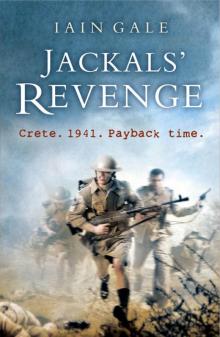 Jackals' Revenge
Jackals' Revenge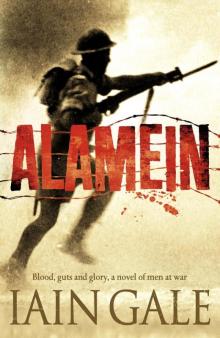 Alamein
Alamein Conspiracy
Conspiracy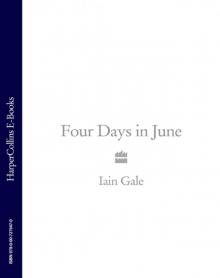 Four Days in June
Four Days in June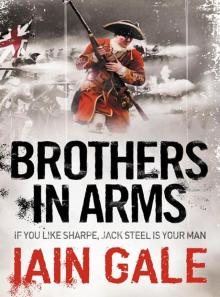 Brothers in Arms (Jack Steel 3)
Brothers in Arms (Jack Steel 3) Brothers in Arms
Brothers in Arms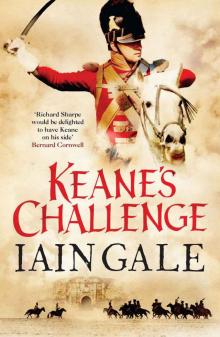 02 - Keane's Challenge
02 - Keane's Challenge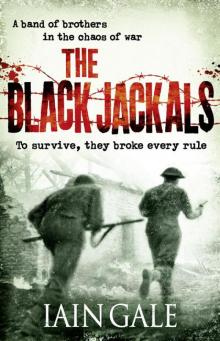 The Black Jackals
The Black Jackals Man of Honour
Man of Honour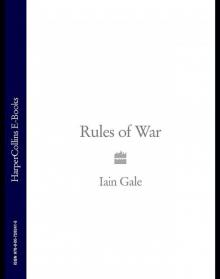 Rules of War
Rules of War